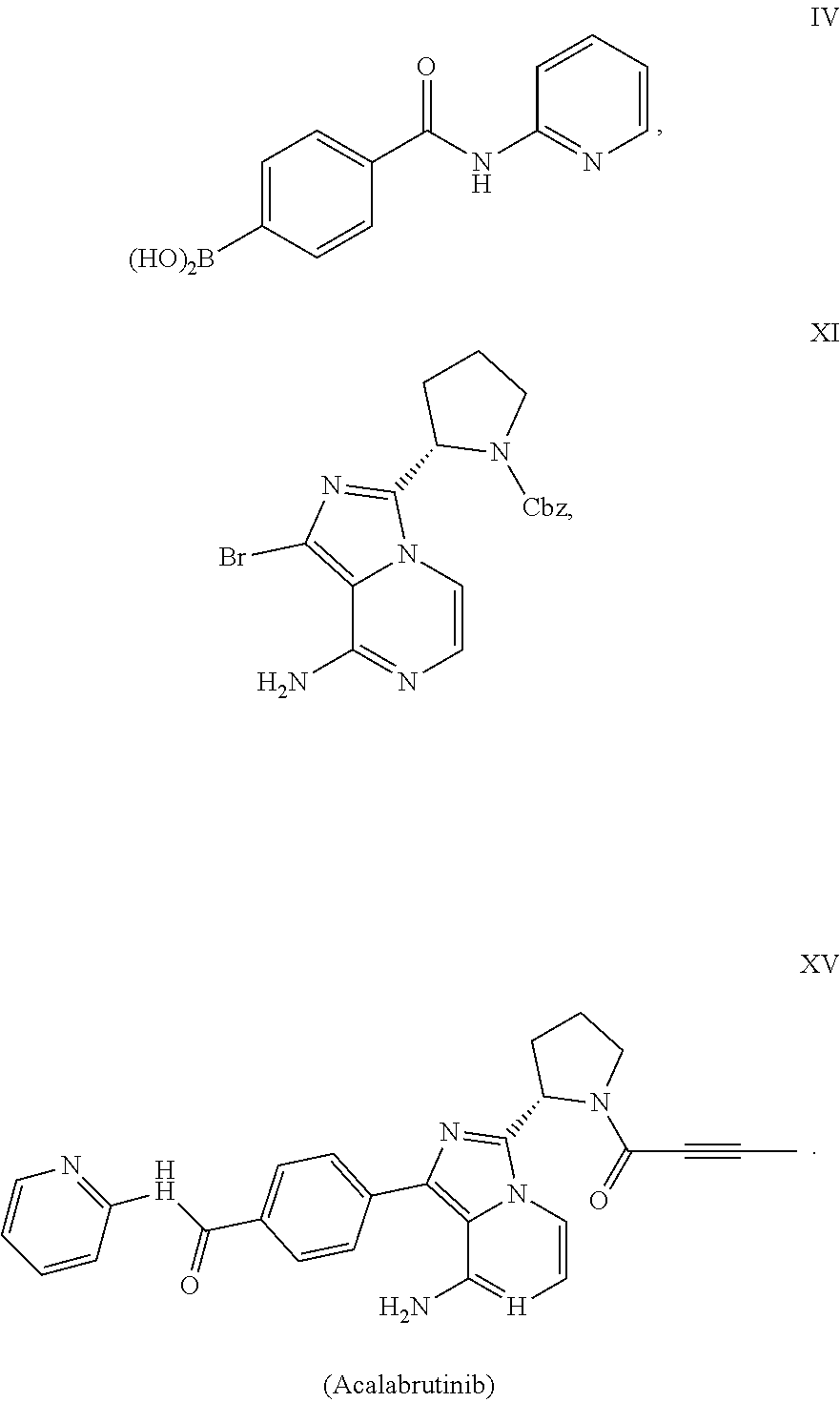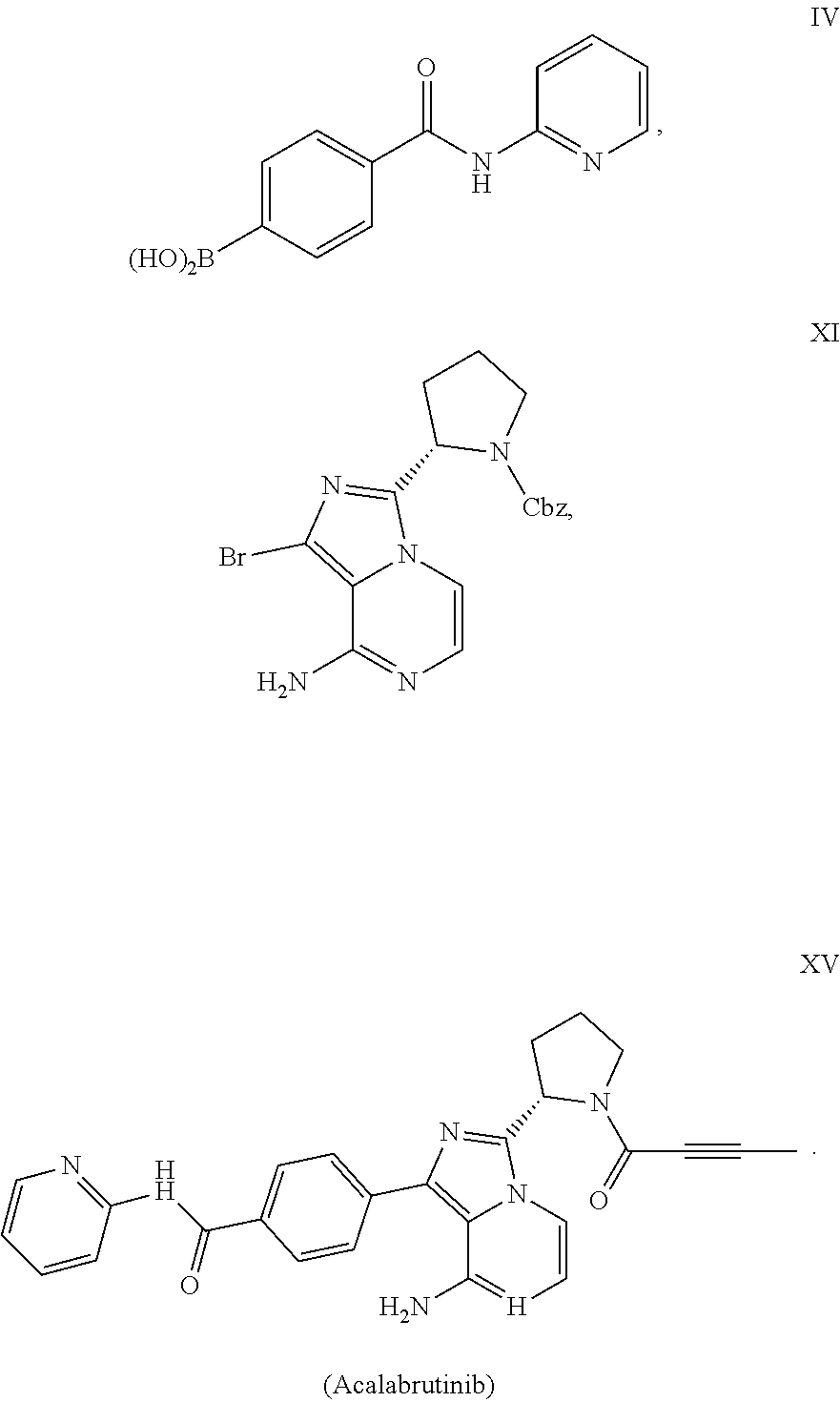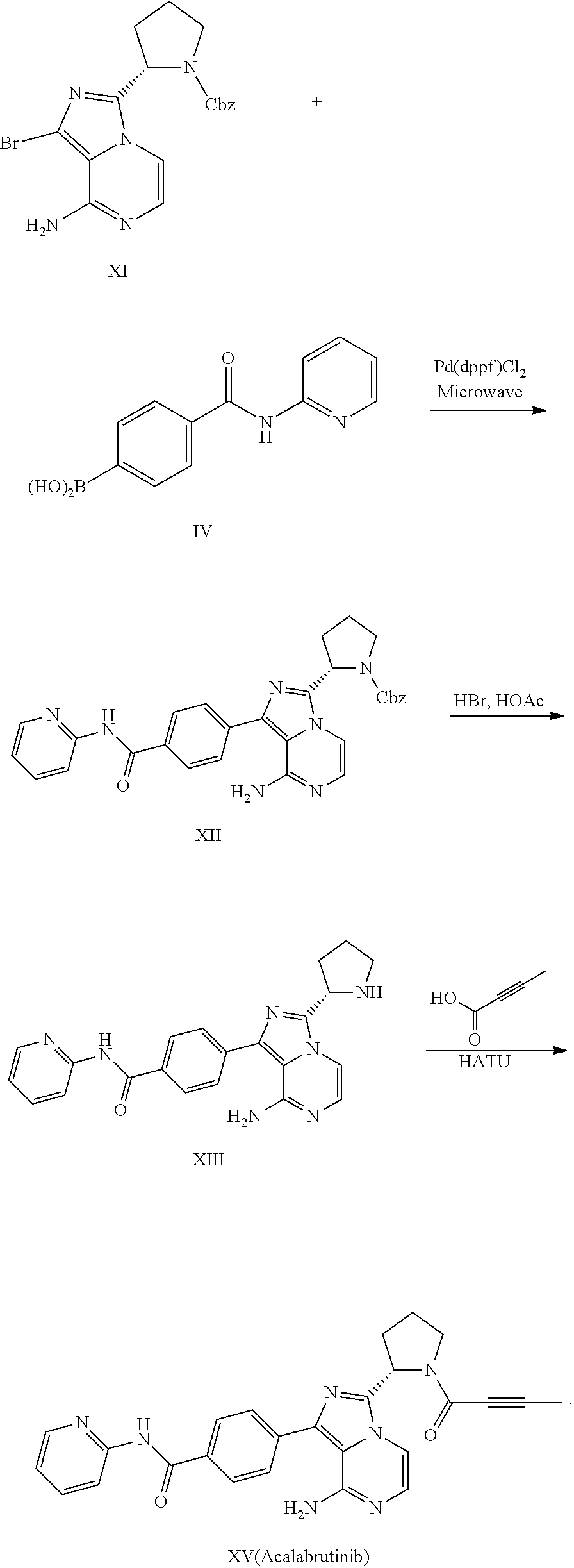Processes to produce acalabrutinib
a technology of acalabrutinib and acalabrutinib, which is applied in the field of processes to produce acalabrutinib, can solve the problems of high raw material cost, ammonia gas, and unsuitable scale-up production, and achieve the effect of cost-effective and scalable production
- Summary
- Abstract
- Description
- Claims
- Application Information
AI Technical Summary
Benefits of technology
Problems solved by technology
Method used
Image
Examples
example 1
of Compound III
[0051]
[0052]To a mixture of 4-bromobenzoic acid (2.0 g, compound I-a) and triethylamine (1.11 g) in 1,4-dioxane (16 mL), methanesulfonyl chloride (1.25 g) was added dropwise. The mixture was heated to 40° C. and stirred for 2 h. DMAP (1.35 g) and 2-aminopyridine (1.41 g) was added. The mixture was heated to 60° C. and stirred for 3 h. The reaction mixture was quenched with water (20 mL), and extracted with EtOAc twice (2×20 mL). The combined organic phase was concentrated under vacuum. The crude material was purified by silica gel column chromatography using heptane / EtOAc to afford compound III-a (69% yield).
[0053]1H NMR (400 MHz, DMSO) δ 10.90 (s, 1H), 8.40 (dd, J=4.8, 1.1 Hz, 1H), 8.18 (d, J=8.4 Hz, 1H), 8.03-7.93 (m, 2H), 7.91-7.81 (m, 1H), 7.77-7.67 (m, 2H), 7.26-7.11 (m, 1H).
example 2
of Compound III
[0054]
[0055]To a round-bottom flask was added 4-bromobenzoic acid (20.0 g, compound I-a), 1,1′-Carbonyldiimidazole (CDI, 19.34 g) and toluene (200 mL). The mixture was heated to 60° C. and stirred for 2 h. 2-Aminopyridine (14.04 g) was added. The mixture was heated to 100° C. and stirred for 4 h. The reaction mixture was washed with saturated Na2CO3 aqueous solution, water (twice), and brine. The organic phase was concentrated to 100 mL, cooled to 0˜5° C., and then stirred for 1 h. After filtration and drying, compound III-a was obtained as a white solid (23 g, 84% yield).
example 3
of Compound IV
[0056]
[0057]To a round-bottom flask was added i-PrMgCI solution in THF (10 mL, 2 M) and THF (20 mL). The mixture was cooled to −20˜-30° C. n-BuLi solution in n-hexane (16.4 mL, 2.5 M) was added dropwise. After 10 min, a solution of compound III-a (5.00 g) in THF (35 mL) was added into the mixture at −20˜-30° C. and stirred for 20 min. Trimethyl borate (3.75 g) was added at −20˜-30° C. The reaction mixture was stirred for 16 h at this temperature. The reaction mixture was quenched with saturated NH4Cl aqueous solution (50 mL), and extracted with EtOAc three times. The combined organic phase was concentrated and concentrated under vacuum. The crude material was purified by silica gel column chromatography using DCM / MeOH to afford compound IV (2.00 g, 45.8% yield).
[0058]1H NMR (400 MHz, DMSO) δ 10.75 (s, 1H), 8.52-8.36 (m, 1H), 8.35-8.17 (m, 2H), 8.11-7.79 (m, 5H), 7.24-7.12 (m, 1H).
PUM
| Property | Measurement | Unit |
|---|---|---|
| temperature | aaaaa | aaaaa |
| temperature | aaaaa | aaaaa |
| silica gel column chromatography | aaaaa | aaaaa |
Abstract
Description
Claims
Application Information
 Login to View More
Login to View More - R&D
- Intellectual Property
- Life Sciences
- Materials
- Tech Scout
- Unparalleled Data Quality
- Higher Quality Content
- 60% Fewer Hallucinations
Browse by: Latest US Patents, China's latest patents, Technical Efficacy Thesaurus, Application Domain, Technology Topic, Popular Technical Reports.
© 2025 PatSnap. All rights reserved.Legal|Privacy policy|Modern Slavery Act Transparency Statement|Sitemap|About US| Contact US: help@patsnap.com



